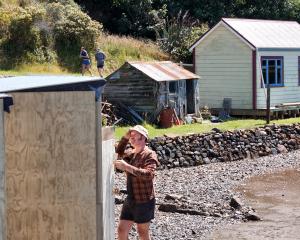Mulch community spirit with cottage industry and the result is an organic vegetable garden in the heart of Middlemarch, writes Shane Gilchrist.
Middlemarch, the Strath-Taieri town which serves as a start or end point for the many cyclists who meander along the Otago Central Rail Trail, has recently witnessed growth of a sort that has little to do with tourists.
The Stationmaster's Cottage, long privy to the hiss and hoot of steam trains or the deep vibrations of diesel engines, is now host to slower rhythms.
Beyond the fence palings, yet not far from the railway tracks, cabbage, lettuce, pumpkin, spinach, leeks, broccoli and good old cauliflower are set to bide their time.
The initiative of Patricia Bosshard Browne, the Grocott's Organic Community Garden was first mooted in late 2007 when a proposal was put to Taieri Gorge Ltd, which owns the Stationmaster's Cottage and property, to create an organic vegetable garden, landscape the area and eventually use the house for an artist's residency.
In growing fresh vegetables, Mrs Bosshard also hopes to reduce food miles, create a seasonal gardening job and introduce adults and children alike to the methods of organic gardening.
"We struggled through that first year. First of all, it was me. Four months later, there were two of us. Now, there are five people, with probably another two coming.
"Each gardener will have a year to design the garden and instruct us in what to sow." The garden (named after H. Grocott, the first stationmaster in Middlemarch, who lived there with his wife and eight children) is now into its second full season, with spinach, leeks, broccoli and cauliflower in the ground.
Earlier this week, Mrs Bosshard planted a "load of lettuces" that had been growing in a Dunedin glasshouse.
"We'll cover them with pine needles, which helps keep the frost off," she explains.
"We've got beans to go in but we are really cautious. We have frosts in October, and they can catch us out even in December.
"It is interesting looking in the garden shops and vege plots in Dunedin. They have got crops we wouldn't dream of putting in at the moment.
"It is such a difficult area to farm in," Mrs Bosshard says, referring to the climatic extremes of the Strath-Taieri. "We mulch to retain moisture. A lot of people weed then need water, but in an area like ours, you really have to mulch. We have virtually no weeds and use little water.
"We have very fine soil. It takes years to build it up so that it becomes friable.
"We mulch over the top, don't disturb it and let the worms and so on slowly change it."
To create the raised beds at the community garden, close to 20 tons of soil was donated from nearby Cottesbrook farm.
Physical labour was also free, as was the garden's red tool shed, supplied by the Blokes Shed of Mosgiel.
"I approached people I knew I could work with. Sometimes two or three men would help with the next lot of activity when they had finished a busy period of farming," Mrs Bosshard says, adding community spirit has been a key factor in the establishment of the garden.
"Growing veges like this breaks down lots of barriers between new residents, elderly residents ... I'm quite confident people will either grow their own veges or will get them from the garden. The café at the store gets the veges to make soup for the cyclists, which is good.
"There are all those little things. And they are little, but they make up a community and give it a sense of place in changing times.
"It is very easy to lose those connections. There are a lot of new people in the district.
"There was a meeting in the hall last week and it brought younger people in to learn what was going on in the community.
"I think for small country towns to survive, there is a level of participation required of everyone. It is a slow process, and that is alright, and you slowly get to know one another."
In season, the garden supplies boxes of produce to Middlemarch residents, excess vegetables to the Presbyterian Support Foodbank Otago, local eating-houses as well as to those who grow the produce.
"After doing a bit of research in the district, it is evident that if the vegetables were grown, there is the demand: the Lions need lots of onions, Strath-Taieri Rural Women do many meals for public gatherings, and there are a number of shearing gangs that need wholesome food.
"I worked out that an eating outlet would take enough lettuces in a week to come up to the subsidy allowed for someone on the dole," Mrs Bosshard says in reference to a proposed seasonal job "for a young person or for someone who needs that extra cash".
Once a week during the growing period, pupils from the Strath-Taieri School visit the garden.
This year, a science area and a nursery are being developed, which will include plant experimentation, composting and a small, self-contained worm farmfor producing liquid fertiliser.
Mrs Bosshard has organised a series of open days this weekend as part of the Otago Central Vulcan and Steam celebration marking the building of the Otago Central Railway to Cromwell (on June 7, 1879, Vincent Pyke turned the first sod at Wingatui).
"They are expecting thousands. It goes on for three days. All the local clubs and organisations have a stall, a presence, basically.
"I said I'd do a talk - some time around 2pm on Sunday and Monday - on how to get something like this up and running, which is possibly more interesting than talking about how to grow carrots, you know."












